Echo Park Lake is pretty quiet these days, aside from flocks of geese fighting over breadcrumbs. Neighborhood local Dino Aguayo, 74, has been visiting the park for the past 60 years. He says he could get used to this.
“There’s been a lot of changes right here,” Aguayo says. “Since the homeless are not here, it’s better, brother. You don’t see that much crap. Not too many robberies or nothing. That’s good. I like it that way.”
Aguayo remembers when a few ramshackle tents first appeared on the landmark park’s north lawn about three years ago. During the pandemic, the camp grew into a bustling open-air commune of more than 200 homeless people — complete with community gardens, makeshift showers, a food pantry and a phone-charging station.
“I know it’s hard for them, the homeless people,” Aguayo says. “I understand. But people didn’t feel safe.”
The tents are now gone, ever since March 25 last year, when the City of LA closed Echo Park Lake and evicted a homeless encampment. The displacement was met by protests, and those protests were met by hundreds of LAPD officers who shut down the neighborhood, arresting scores of demonstrators, legal observers and journalists. 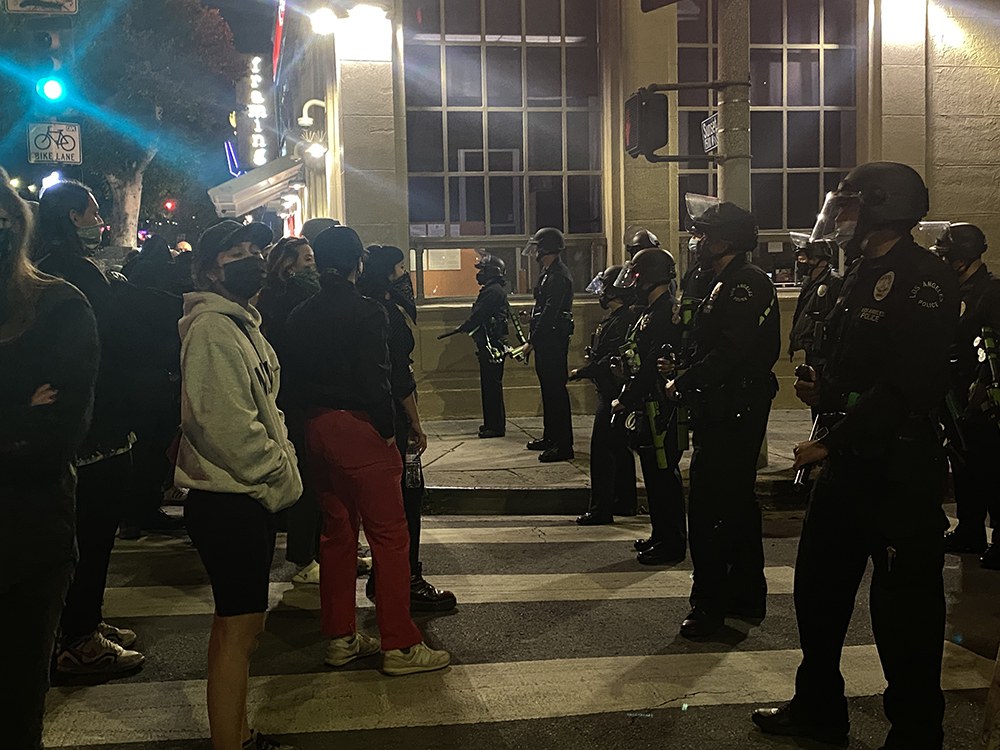 Hundreds of LAPD officers blocked off streets surrounding Echo Park Lake on March 25, 2021 and faced off with protestors. Photo by Aaron Schrank.
Hundreds of LAPD officers blocked off streets surrounding Echo Park Lake on March 25, 2021 and faced off with protestors. Photo by Aaron Schrank.
Work crews installed a chain-link fence around the park to keep campers out, and most of the unhoused residents were moved into temporary shelter, with the promise of permanent housing down the line.
That divisive police-led breakup of the camp has had lasting consequences –– not only for the homeless people displaced from their makeshift community, but also on the city’s approach to its worsening homelessness crisis
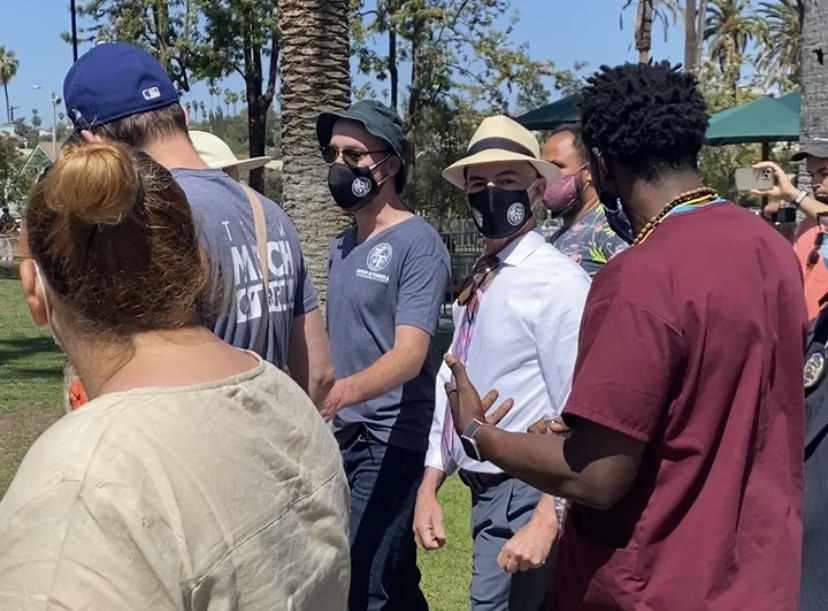
Councilman Mitch O’Farrell visiting Echo Park Lake for its reopening, before being run out of the park by protestors, on May 26, 2021. Photo by Aaron Schrank.
LA City Councilman Mitch O’Farrell, who represents Echo Park, described the effort in a tweet last year as “one of the most successful housing operations” in LA history.
Of the 200 or so homeless people kicked out of the park before the police moved, 178 of them accepted offers of shelter and were at least initially moved indoors, according to the Los Angeles Homeless Services Authority, or LAHSA.
But over the past year, more than half of those people left their programs, usually returning to the street. Another 79 remain in temporary housing or shelter, most through Project Roomkey –– hotel rooms funded by the government amid the pandemic.
And despite official assurances that those displaced from Echo Park would be in stable, permanent housing within a year, the number who have a long-term roof over their heads is in the single digits.
Today, just nine of the unhoused former Echo Park Lake residents have been placed into permanent housing, according to LAHSA, though a new report produced by UCLA’s Luskin Institute on Inequality and Democracy counted 17 former Echo Park Lake residents in some form of housing, including housing LAHSA considers temporary.
The UCLA researchers also determined that seven people displaced from the park last year have since died.
In comparison, a similar effort in Venice Beach last summer has placed 82 people in permanent housing, according to the St. Joseph Center –– around 40% of the more than 200 people displaced.
O’Farrell declined an interview for this story and did not comment on the number of people placed in permanent housing. But a spokesman for O’Farrell defended the Echo Park Lake closure in a recent email.
"There is nothing compassionate about enabling people to live or die in squalor on sidewalks or in public parks,” wrote Dan Halden, O’Farrell’s communications director. He noted that Echo Park Lake “has been safe, clean and secure” since reopening in May 2021.
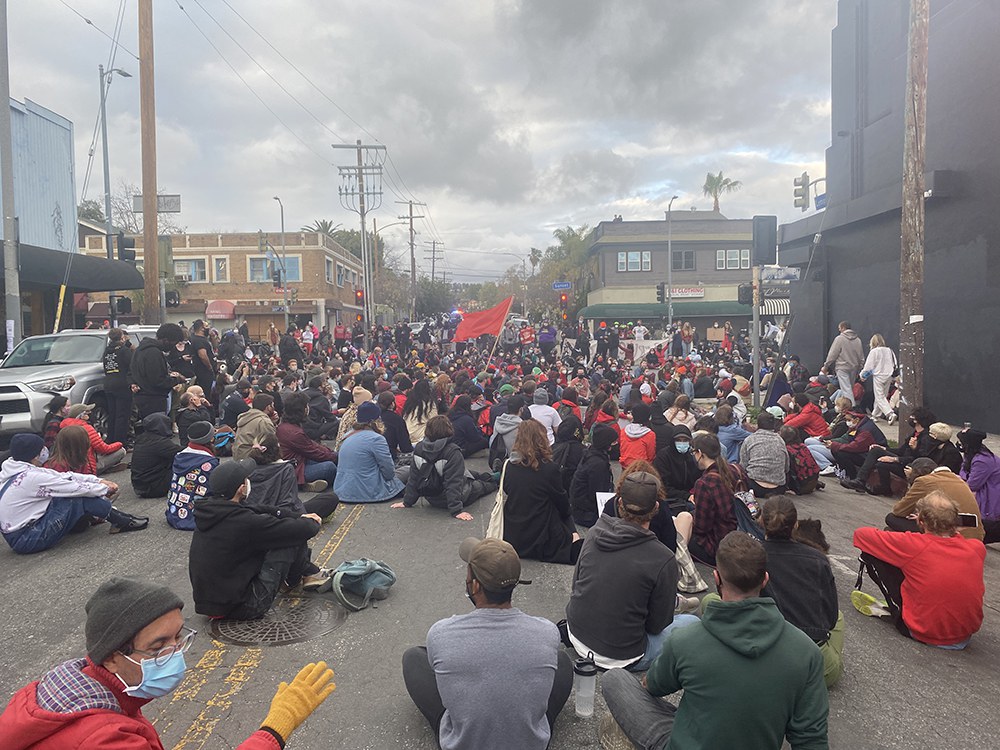
Hundreds gathered to show support for the unhoused community at Echo Park last March. Hours later, nearly 200 demonstrators were arrested while city crews closed the park. Photo by Aaron Schrank.
But where some saw danger and squalor, many unhoused angelenos found an oasis from the harsh realities of life on the street.
“It was a place where I knew I could get some rest if I needed it,” says Will Sens, who camped at the park for several months prior to the raid. “I would get super worn out from pushing everything I own around in a cart,” he adds. “Having a place where I knew I could get food and water and use the restroom and take a nap, it’s priceless when you’re homeless. Because you can’t just lay down anywhere obviously, without people harassing you.”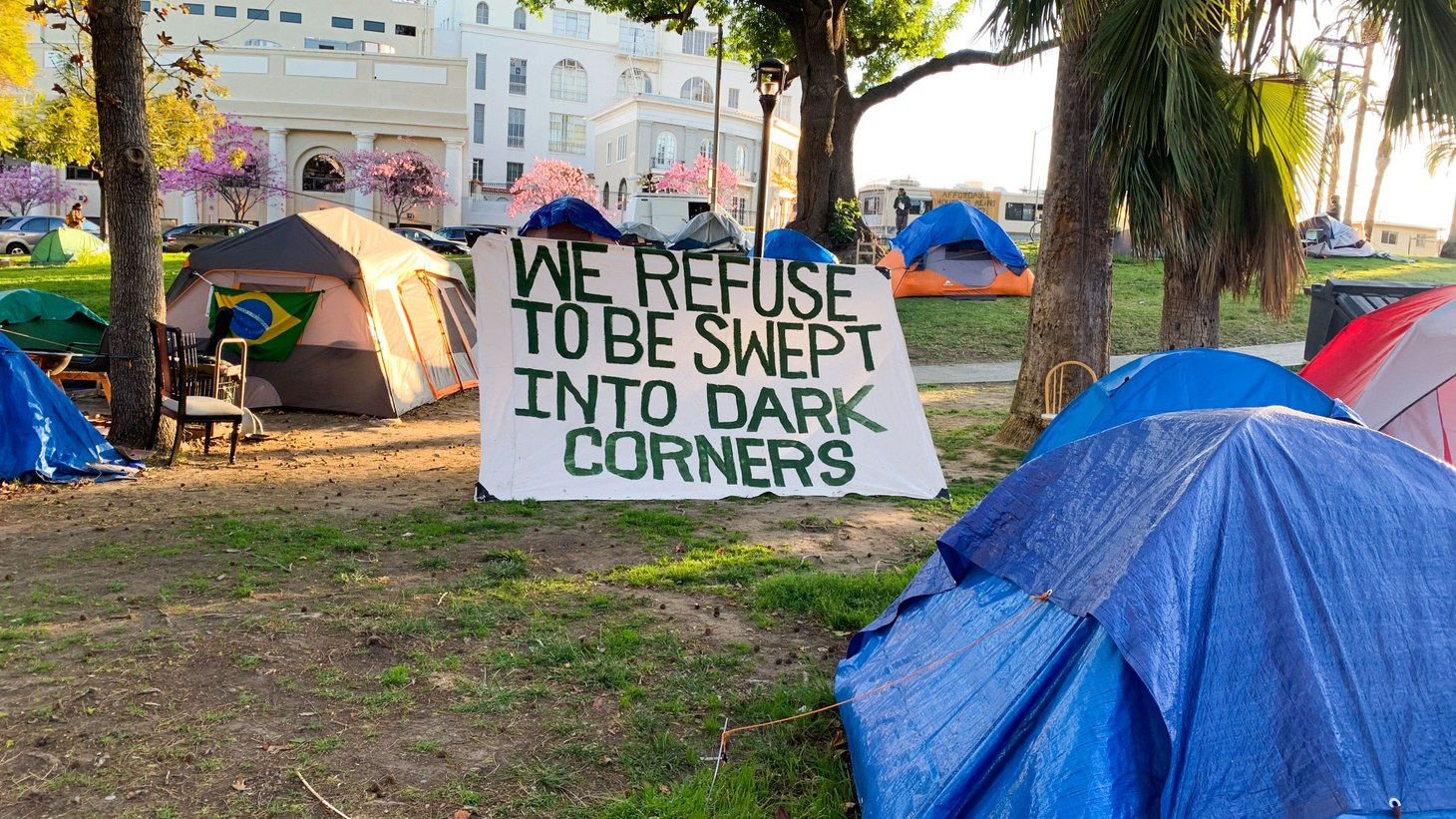 A sign by homeless camps at Echo Park Lake says, “We refuse to be swept into dark corners.” March 24, 2021. Photo by Anna Scott.
A sign by homeless camps at Echo Park Lake says, “We refuse to be swept into dark corners.” March 24, 2021. Photo by Anna Scott.
David Busch-Lilly saw the Echo Park camp as more than a rest stop; he says he felt part of building a community. Busch-Lilly has been homeless since the 90s, sleeping on sidewalks on LA’s West Side and advocating for others like him. After the pandemic hit, he moved to the Echo Park Lake encampment.
“We saw how a really beautiful thing was happening here,” Busch-Lilly says. “We spend all of this money trying to help homeless people deal with their mental trauma. And the park setting was one of the most healing things that so many homeless people found here. It’s a form of mental health treatment, a very cost-effective one.”
Busch-Lilly says LAPD officers approached his tent twice, offering a hotel voucher if he’d pack up and leave. He refused to do so, and he was eventually arrested during the raid.
Busch-Lilly takes exception to the idea of handing out precious shelter placements based on which homeless encampment officials want to clear. Pre-pandemic, LA’s homeless services system typically prioritized those deemed neediest. Diverting those resources to everyone at Echo Park, regardless how needy they were, didn’t sit right with him.
“There were people all throughout LA that had a much greater need even for a three-month stay in a hotel room during the Echo Park cleanup,” Bush-Lilly says. “We need to make sure that whatever agencies we have that are allocating resources, that they are free from political pressure and that they are need-driven. If we need to learn any lesson from Echo Park, it’s that.”
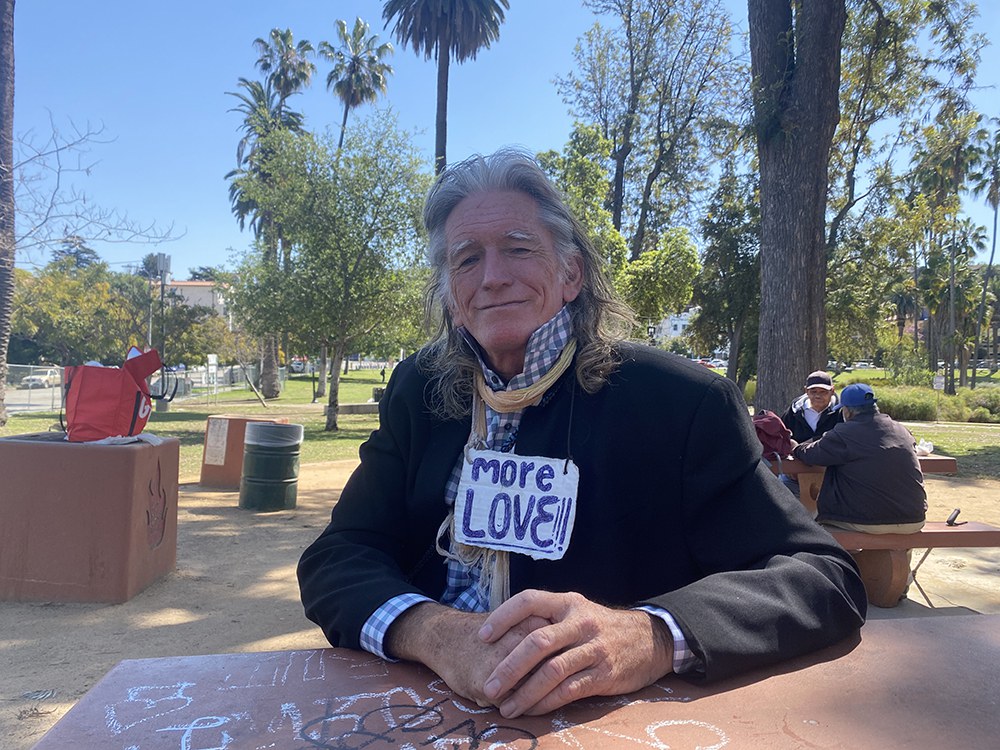
Unhoused activist David Busch-LIlly visiting Echo Park Lake one year after he was evicted by police. Photo by Aaron Schrank.
For those who moved from the park into temporary shelter, the transition could be lonely at best, and jail-like at worst, unhoused residents told KCRW.
Will Sens had been camping at the park with his girlfriend for several months when they were offered a room in the LA Grand Hotel Downtown. He says he feels lucky to be able to move with her. “People that are alone it’s really hard for them,” says Sens. “Like really hard. I can’t imagine if I had a drug or alcohol problem and I was there.”
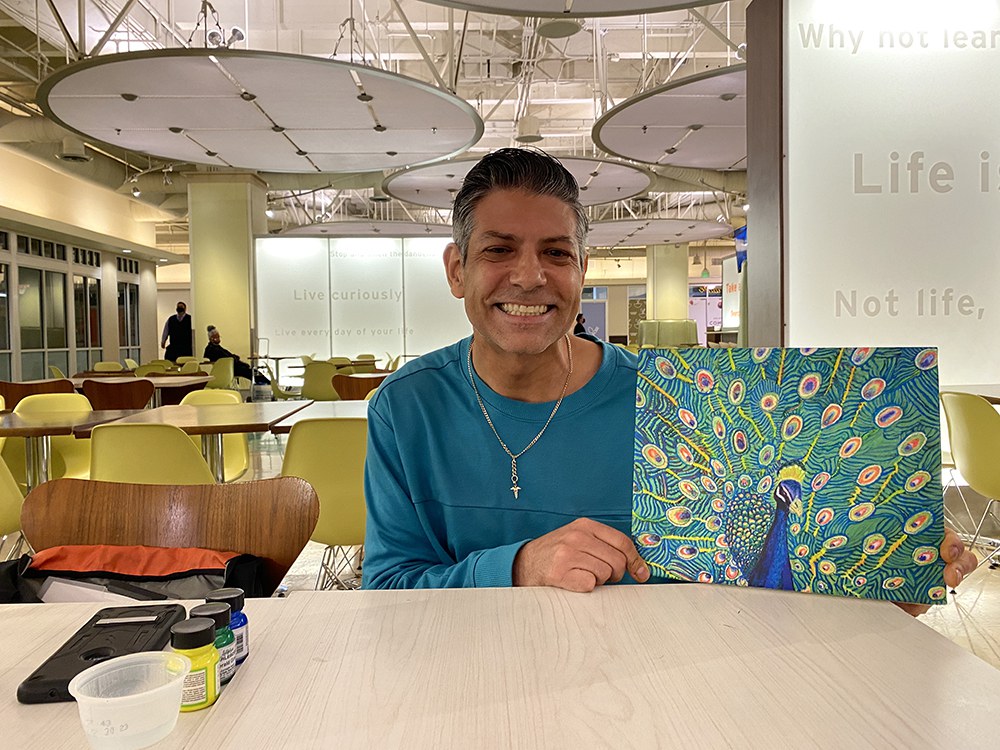
Will Sens, a homeless former resident of Echo Park Lake, is an artist and activist for the unhoused. Photo by Aaron Schrank.
Sens is part of a group called Unhoused Tenants Against Carceral Housing, which was formed to advocate for better living conditions inside Project Roomkey sites. Sens and others told KCRW that at the Grand Hotel there’s constant tension between residents and staff, who enforce curfews and control access to the rooms.
“They take control of your things, that’s carceral,” says Sens. “When you don’t have control of your actions and your body, you don’t have your agency and your own space, that is carceral. And you’re being punished for being poor.”
Sens says the conditions inside Project Roomkey are inhumane, which is the same argument Councilman Mitch O’Farrell made about the Echo Park encampment.
O’Farrell, who is up for reelection this year, points to four deaths in the park in 2020 as evidence of poor safety conditions there.
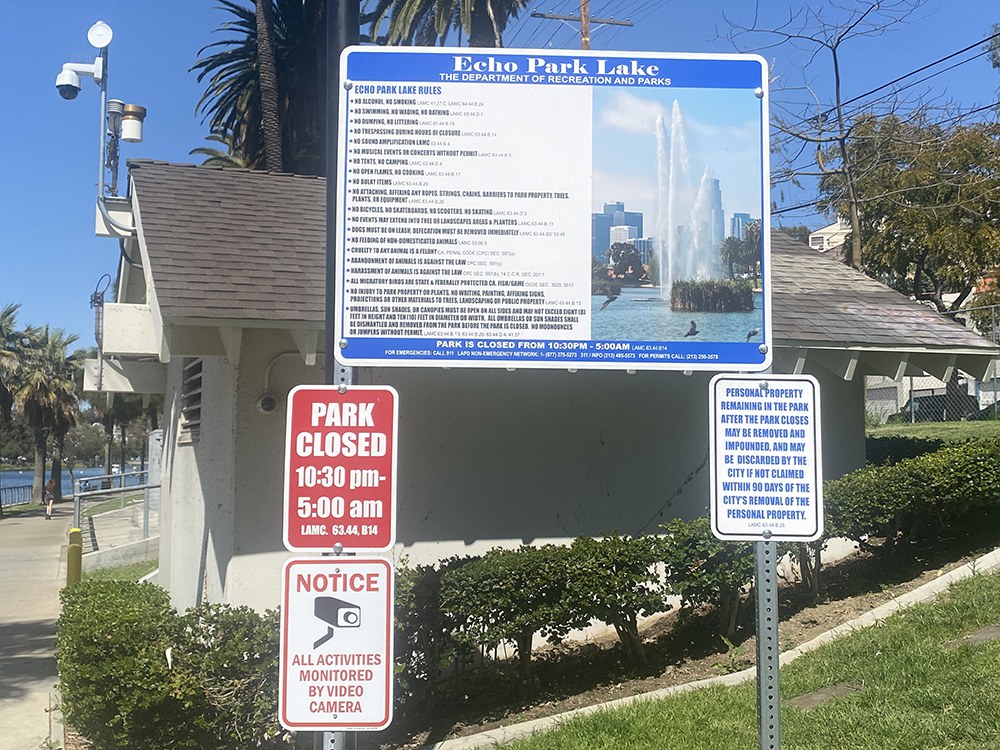 New signage and rules were added to Echo Park Lake when it reopened in May 2021. Photo by Aaron Schrank.
New signage and rules were added to Echo Park Lake when it reopened in May 2021. Photo by Aaron Schrank.
The breakup of the Echo Park camp wasn’t the first time local leaders flooded a specific geographic location with offers of temporary shelter, but, for better or worse, the controversial action charted a clear course for local leaders. The approach has since been replicated to clear encampments in Venice Beach, MacArthur Park and, just last week, Little Tokyo. LA’s recent update to its anti-camping ordinance means there’s more to come.
But LA City Councilman Mike Bonin, who represents Venice, says he learned a thing or two from Echo Park.
“Anytime you do something big in government, you look at what has been done before,” Bonin says. “And there were things about Echo Park where we learned and said, ‘We ain’t going to do this.’ Before we did Venice in my district, I told my staff, ‘In so many ways, we need to do the opposite of what they did there.’”
So when Bonin worked to clear out a homeless encampment of more than 200 people at Venice Beach in July, he says he took a different tack: fewer cops, no fencing, more intensive outreach to the unhoused and more notice and transparency to the community-at-large, he says. The councilman says he also tried to be clear about the goal of the effort, and how to measure its success or failure.
“There were a lot of people in Venice who were saying ‘clear the beach, clear the beach, clear the beach.’ And I said, ‘Listen, we are going to go in and try to get everyone indoors and get them a housing resource. The consequence of that will be the beach will be clear.’ I wanted the beach being clear to be the consequence, not the aim.” 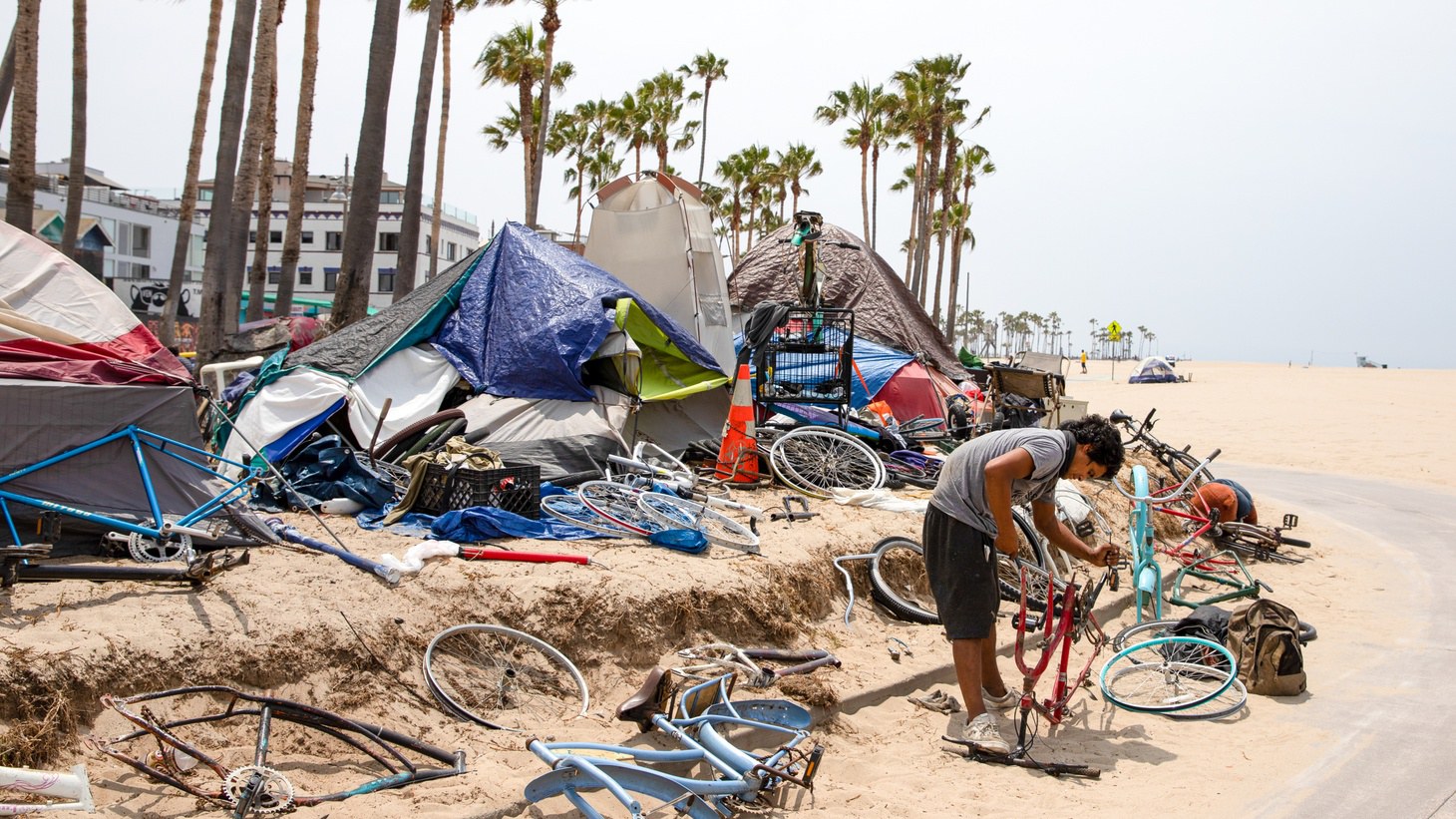
An unhoused man tinkers with bicycle parts along the Venice bike path, June 29, 2021. Photo by Zaydee Sanchez.
Bonin says these location-based approaches turn the traditional needs-based system on its head, but there are benefits. These initiatives can create a sense of momentum among an unhoused community. If someone sees their neighbor accepting services, maybe they’re more likely to do so.
“I’ve seen that happen in a number of places where we have done an approach like that,” says Bonin. “People who are living on the streets together move off the streets together.”
It can also streamline some of the bureaucracy around bringing people indoors, Bonin says –– forcing various agencies and resources to coordinate.
“The traditional approach is so scattered that sometimes it takes longer to help that person in need,” says Bonin. “In some cases, if you do the place-based one right, you may wind up helping a greater number of people in need more quickly, even as you house people with less need.”
While Bonin’s Boardwalk effort avoided Echo Park Lake-level controversy, many of the progressive councilman’s approaches to homelessness have angered some of his Westside constituents.
His proposal last year to consider a handful of parks and beach parking lots as sites for sanctioned campgrounds drew fierce opposition and fueled a failed recall effort against him.
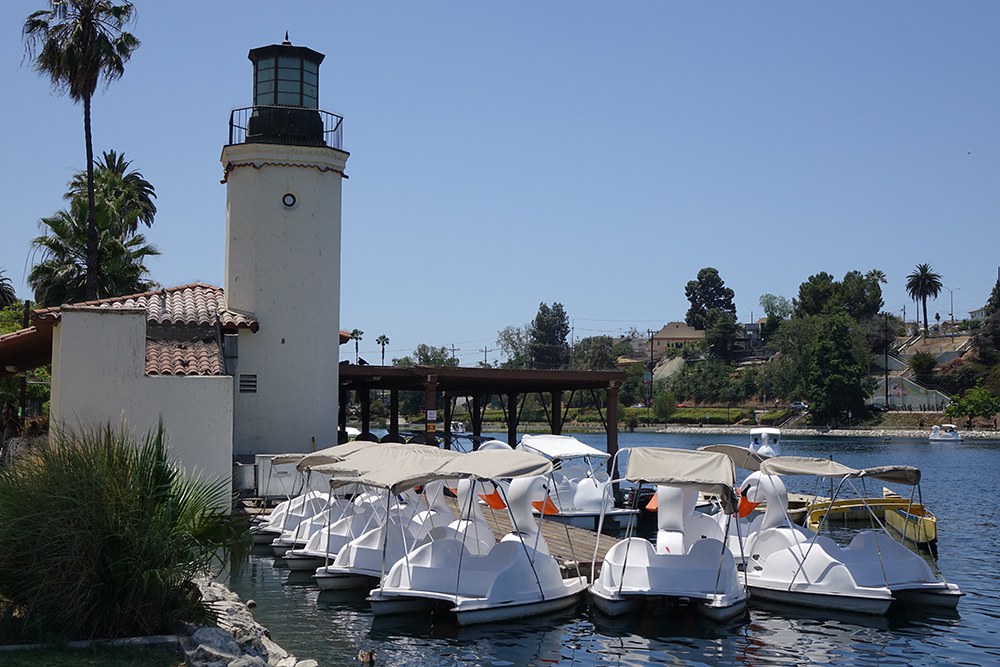
Echo Park Lake’s signature swan pedal boats. Photo by Edward Weston via Flickr Creative Commons.
At Echo Park Lake now many visitors tell KCRW they aren’t terribly concerned about where the homeless ended up.
“The question is ‘Who’s more important? The homeless drug addict or the people who pay taxes and work and try to raise their kids?’” says Mark Fagin, a West Hollywood resident who avoided Echo Park Lake during the pandemic and was walking his dog there on a recent afternoon.
“You know the pollution, the environmental pollution was grave,” Fagin says. “I see a gigantic difference now that there’s a zero tolerance for camping and for the homeless living here. Definitely improved. We come back a lot more often.”
For some, it’s more nuanced. Shane Stoltz lives across the street from the park. He takes issue with a chain link fence that still encloses the park, with four access gates allowing visitors to come and go. Mitch O’Farrell erected it one year ago while the park was closed for a couple of months last year and the city did more than $1 million in repairs, including reseeding grass, disposing of waste and installing security cameras.
“I do have a lot of mixed feelings about it,” Stoltz says. “One thing that really bothers me is the fence. I get it when you guys were making the changes, but as soon as that happened, the fences should have come down.”
For David Busch-Lilly, the fence is a stark reminder of what took place here a year ago.
“It’s a very graphic symbol of the way we’re fencing our minds off from looking at the deep issues,” Busch-Lilly says. “That we have on one side of the fence this nice little paradise that we’re trying to artificially prop up, and on the outside of it we have a community that’s increasingly fearful of becoming homeless and ending up on the sidewalk.”
Some say the fence has damaged the sense of community that once existed at Echo Park Lake.
“I think people can see that the fence has a lot to do with not just displacing unhoused people, but also gentrification, displacing vendors –– they’re not in there anymore,” says Dave Hunter, a member of the Echo Park Neighborhood Council. “We always ask, ‘When is the fence coming down? What are you doing to find out what the community really thinks?’ There has been nothing yet. And it’s been a year.”
Councilman O’Farrell declined to answer questions about how long the fence will stay. And so it remains indefinitely, along with deep community concerns and divisions over what happened here one year ago.
